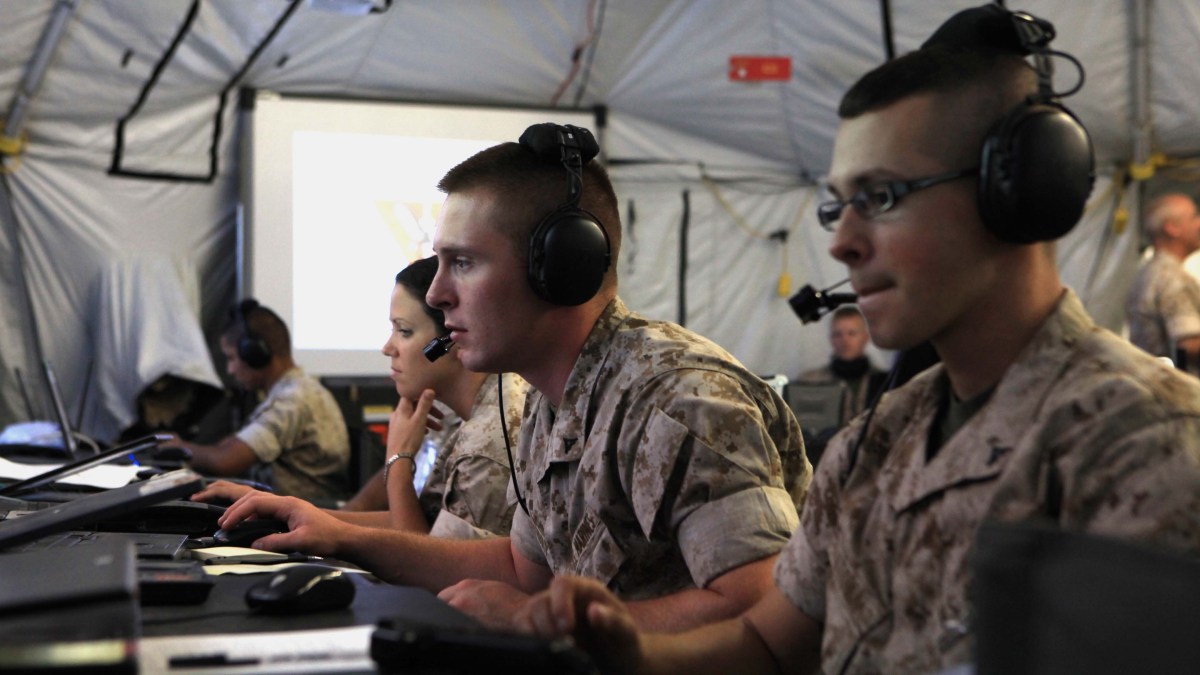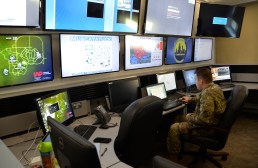Marine Corps to release new doctrine on information

Following years of effort and investment – to include a new three-star position, several organizational changes and establishment of new forces – the Marine Corps is readying to formalize doctrine on the information environment.
The new publication, Marine Corps Doctrinal Publication-8, Information, slated for release in the next month or so, seeks to describe the purpose and mechanics of information as a warfighting function for the entire service.
The formalization of information into doctrine follows several efforts the Corps has undertaken within the past five or so years. These include the recognition of information as the seventh warfighting function, sacrificing a three-star billet elsewhere within the service – no small effort given how small the Corps is – to create the deputy commandant for information, the creation of the Marine Expeditionary Force Information Groups – which encompass tactical cyber operators to conduct defensive cyber ops, electronic warfare, signals intelligence and other information-related activities – and a revision to its 17XX occupation field from cyberspace operations to information maneuver.
The new publication (MCDP-8) “is like a mark in time where we went back and said, ‘Okay, let’s take a step back and let’s really level set where we’re at with respect to the information environment and let’s start with the very essence of it – information,’” Lt. Gen. Matthew Glavy, deputy commandant for information, said in a recent interview with FedScoop. “We have a baseline approach to our conversation with our Marines, from NCOs all the way to general officers, having a baseline of what information is and specifically, as a warfighting function, its complement to both cyberspace and space as domains and how the Marine Corps is going to take best advantage of it.”
In response to adversary activities, each of the U.S. military services in recent years have reorganized in some manner under the banner of information warfare. The Marine Corps, for its part, purposely eschews the term “information warfare” and opts for “operations in the information environment.”
The new doctrinal publication builds upon the Marine Corps’ foundational doctrine, MCDP-1, Warfighting, Glavy said, noting it discusses how to lay information into that cornerstone doctrine.
MCDP-8 is organized into three areas, Glavy said: systems overmatch, prevailing narrative and resiliency.
The Corps wants to provide overmatch relative to adversaries’ technology. Second, it wants to be on the right side of history, as Glavy described it, being conscientious of what narratives it puts out, and how they reflects what the Corps is doing all the way down to the unit level. Third, Glavy said Marines want to be resilient in the face of sophisticated adversary onslaughts.
“You got to make a decision – are you going to counter something, or do you live to fight another day, to start anew?” he said, regarding resiliency.
Glavy said the hope is that MCDP-8 will be very adaptable, considering how fast moving the information environment is. Much more so than MCDP-1, for example.
The new 17XX occupational field, which adds new military occupational specialties such as influence and space experts, is a piece of this larger information environment puzzle.
Glavy called it the start of a journey and recognized that there will likely be “a couple of turns, a couple of reps and sets” to see if the Marines got it exactly right.
For others in the Corps, the revision to the occupational field provides a “sense of stability.”
“It adds a sense of clarity that the Marines have been asking for in terms of what is their … roadmap, what does their career path look like and what are those opportunities within there? Now it is clear,” Maj. Gen. Ryan Heritage, commander of Marine Corps Forces Cyberspace Command, said in a recent interview with FedScoop. “I think that stability helps a recruiter on the street. They know exactly what they’re looking for and then have a clear definition of what that Marine is responsible for. I think it helps from a force generation perspective.”
The revision acknowledges the importance of the larger information environment and is a recognition of how important it is in force design efforts the Marine Corps is undertaking, Heritage said.
As part of its approach to the information environment, the Marines are heavily incorporating their public affairs professionals and communication strategy and operations, or COMMSTRAT.
“I would equate what COMMSTRAT does, specifically the public affairs side of it, as being 10 digit quality, JDAM [Joint Direct Attack Munition] precision,” Glavy said. “As we inform friends, allies, everybody through our various COMMSTRAT execution, we got to be really good at it. It’s precision, it’s quality, and so it’s absolutely part of every MEF (Marine Expeditionary Force) commander’s ability to execute their mission.”
Glavy said if there isn’t a COMMSTRAT element involved in exercises and operations – both in conflict and in the competition phase – that drives outcomes prescribed by MEF commanders, then the Corps is missing “incredible opportunities.”
Space and the information environment
The Department of the Navy, which includes the Marine Corps, has uniquely coupled cyberspace operations with space, including it in the larger information environment.
Both the Navy and Marine Corps have dual-hatted their cyber commanders as the service components for space.
“It’s a natural convergence. You can’t do one without the other and you can’t do really any of the other information-related capabilities without either one of those two,” Heritage said. “The convergence and putting it under one hat makes a lot of sense.”
There is a lot of connectivity between what the Corps does in cyber and space and how it fits into the broader information environment, Glavy said.
There is incredible reliance on space as a transport layer for command and control. As such, one of Marine Corps Forces Cyberspace Command’s core missions is to secure, operate and defend the network.
The deputy commandant for information’s office also has responsibility for intelligence, Glavy said, adding that space is “the ultimate high ground.”
“Space gives an incredible advantage on multiple areas, multiple warfighting functions in order to use it as an asymmetric advantage. No space, no chance. Space is a first move, [and it is] so, so important that we have the advantage in space,” he said.






